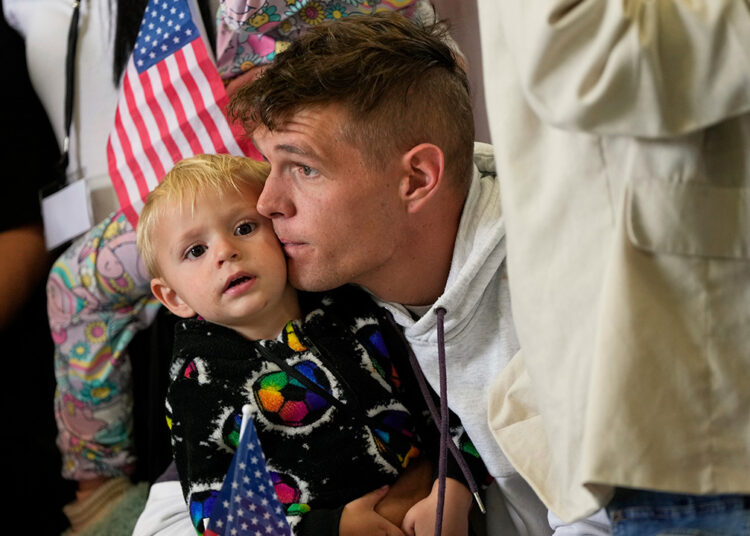1
According to South African History Online, “the modern Afrikaner descends from Western Europeans who settled in the southern tip of Africa in the mid-17th century. A mix of Dutch (34.8%), German (33.7%) and French (13.2%) settlers formed a cultural group that completely identified itself with the African soil.”
But by putting down roots in Africa, Afrikaners, like other white communities, forced the original inhabitants off their lands through violence.
Afrikaners are also known as Boers, a word meaning “farmer,” and the group is still closely tied to agriculture.
In 1948, the Afrikaner-led South African government introduced apartheid, taking racial segregation to an extreme level. Among other things, they passed laws prohibiting interracial marriages, reserving skilled jobs for whites and forcing the Black population to live in townships and homelands.
2
On February 7, President Donald Trump issued an executive order cutting all U.S. financial aid to South Africa and accusing its authorities of mistreating white Afrikaner farmers and confiscating their land.
The document asserts that President Cyril Ramaphosa’s government is encouraging “disproportionate violence against racially disadvantaged landowners.”
One of Trump’s closest advisors at the time, South African Elon Musk, claimed that a “white genocide” was taking place in the country and accused the government of passing “racist property laws.”
South African President Cyril Ramaphosa told Trump during a phone call that his assessment of the situation was “not true.”
3
A first group of white South Africans, numbering 59, arrived in the United States on May 12 with refugee status.
President Trump said the Afrikaner minority’s applications had been processed expeditiously because they were victims of “racial discrimination.”
They received a warm welcome. Refugee processing typically takes months, even years. But in this group’s case, it was processed in record time.
The South African government reiterated that the new arrivals were not suffering any persecution that would justify granting refugee status.
“A refugee is someone who has to leave their country out of fear of political persecution, religious persecution, or economic persecution,” he said. “And they don’t fit that bill.”
Global civil society actors joined him. Human Rights Watch called the measure “cruel racial manipulation,” stating that thousands of people, many of them African and Afghan, had been denied refuge in the United States.
On the domestic front, Gregory Meeks, the ranking Democrat on the House Foreign Affairs Committee, stated that the Trump administration’s refugee resettlement “not just a racist dog whistle, it’s a politically motivated rewrite of history.”
The Episcopal Church declared that it would not collaborate with the federal government in resettling South Africans due to the “preferential treatment” they had been given.
Melissa Keaney, of the International Refugee Assistance Project, stated that the White House’s decision to fast-track the arrival of Afrikaners amounted to “a lot of hypocrisy and unequal treatment.”
Her organization is suing the Trump administration following the indefinite suspension of the United States Refugee Admissions Program (USRAP) in January. This policy has left more than 120,000 conditionally approved refugees in limbo.
Finally, Afrikaner writer Max du Preez declared that the accusations of persecution of white South Africans were a “total absurdity” and “based on nothing.”
4
A week after the group’s arrival, President Ramaphosa visited the White House to try to cool relations between the two countries. But Trump publicly harassed him with the same mantra. And even worse.
In a further act of bullying, the president played a video in the Oval Office showing the burial sites of more than 1,000 white farmers. “This is very bad,” he said. “These are cemeteries, right here. Cemeteries, over a thousand, of white farmers.”
South Africa’s top law enforcement official, Senzo Mchunu, stated that the president distorted the facts to push a false narrative about the mass murders of white people in his country.
“We respect the president of the United States…but we absolutely do not respect his history of genocide,” he said.
When asked about Mchunu’s remarks, the White House recalled Press Secretary Karoline Leavitt’s comments the day before at her briefing, when she said that the video showed crosses representing the bodies of people who were racially targeted by the government.
But the crosses did not mark graves or burial sites. They were a temporary memorial erected in 2020 to protest the murders of farmers in South Africa.
They were placed during a funeral procession in memory of a white couple killed during a robbery on their farm, Mchunu said. Both a son of that couple and several members of the local community argued that the crosses were not cemeteries and were removed after the protest.
But the accusers didn’t care about the facts when repeating the litany. Mchunu announced that of the more than 5,700 homicides that occurred in South Africa between January and March of this year, six were on farms, and of those, only one victim was white.
A former South African legislator went further. Lourens Bosman claimed to have participated in the procession shown in the video played by Trump. It happened near the city of Newcastle, in the eastern province of KwaZulu-Natal, in September 2020.
The crosses symbolized the white and Black farmers and farmworkers who had been murdered across South Africa over the past 26 years, Bosman said.
This campaign of opportunism and disinformation has circulated among far-right groups for many years. In his first term, Trump referred to the “large-scale slaughter of farmers” in South Africa. This is merely a recycling.
5
Afrikaners number more than 2.5 million out of a population of more than 60 million. They represent approximately 4% of the total. None of South Africa’s political parties, including those that represent them, have claimed that a genocide is taking place in South Africa.
Jaco Kleynhans, a senior official with the Afrikaner Solidarity lobby group, claimed to have informed U.S. officials that “there is no genocide nor land confiscation by the government.”
A South African judge dismissed the idea of genocide, calling it “clearly imaginary” and “unreal.”
The key question, then, is why the Trump administration has suspended virtually all refugee admissions for those fleeing famine and war from places like Sudan and the Democratic Republic of the Congo.
And, conversely, why has it facilitated the entry of Afrikaners. This is the white ethnic minority that seized power in 1948 and led the apartheid regime in South Africa.
The answer is in the wind. The Bible has already said it: by your works you shall know them.










